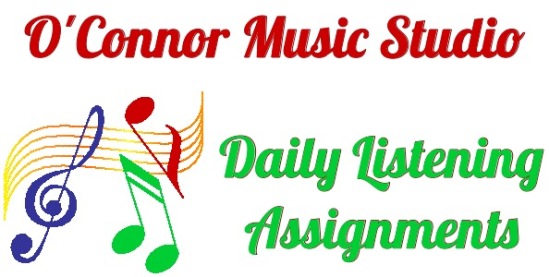Be sure your student reads and listens to Today’s Daily Listening Assignment
• 1625 ~ Orlando Gibbons, English organist/composer, died at the age of 41
• 1665 ~ Nicolas Bernier, Composer
• 1686 ~ Cristoph Raupach, Composer
• 1722 ~ Johann Kuhnau, Composer, died at the age of 62
• 1759 ~ Theodor Zwetler, Composer
• 1785 ~ Gottfried August Homilius, Composer, died at the age of 71
• 1798 ~ Alexey Fyodorovich L’vov, Composer
• 1813 ~ Prosper Philippe Catherine Sainton, Composer
• 1816 ~ Giovanni Paisiello, Italian Composer (Serva Padrona), died at the age of 76
• 1826 ~ Carl Maria von Weber, German Composer (Oberon), died at the age of 39
Read more about von Weber
• 1826 ~ Ivar Christian Hallstrom, Composer
• 1852 ~ Tomasz Napoleon Nidecki, Composer, died at the age of 45
• 1861 ~ Tomas Genoves y Lapetra, Composer, died at the age of 55
• 1863 ~ Arthur Somervell, Composer
• 1868 ~ Anselm Huttenbrenner, Composer, died at the age of 73
• 1879 ~ Adolf Wiklund, Composer
• 1895 ~ August Baeyens, Flemish Composer of Coriolanus
• 1885 ~ Julius Benedict, Composer (Protoghesi), died at the age of 80
• 1894 ~ Immanuel Faisst, Composer, died at the age of 70
• 1908 ~ Luca Fumagalli, Composer, died at the age of 71
• 1909 ~ Alfred Uhl, Composer
• 1913 ~ Friedrich Wildgans, Composer
• 1922 ~ Specs (Gordon) Powell, Musician: drummer: CBS staff musician
• 1923 ~ Daniel Pinkham, American composer
• 1925 ~ Bill Hayes, Singer, entertainer
• 1927 ~ Paul Lacombe, Composer, died at the age of 89
• 1932 ~ Pete Jolly (Cragioli), Pianist
• 1937 ~ Stanley Lunetta, Composer
• 1941 ~ Martha Argerich, Brazilian pianist
• 1941 ~ Floyd Butler, Singer with Fifth Dimension and Friends of Distinction
• 1941 ~ Roy Eldridge was featured on trumpet and vocal as drummer Gene Krupa and his band recorded After You’ve Gone for Okeh Records.
• 1942 ~ Sammy Kaye and his orchestra recorded the classic I Left My Heart at the Stage Door Canteen for Victor Records.
• 1942 ~ Charles Dodge, Composer
• 1943 ~ Bill Hopkins, Composer
• 1944 ~ Riccardo Zandonai, Composer, died at the age of 61
• 1945 ~ Don Reid, Singer, Grammy Award-winning group: The Statler Brothers and CMA Vocal Group of the Year from 1972 to 1980
• 1946 ~ Fred Stone, Singer with Sly and the Family Stone
• 1947 ~ Laurie Anderson, American composer and performance artist
• 1956 ~ Kenny G (Gorelick), Saxophonist. Kenny G is one of the most successful international musicians, a best-selling artist with over 75 million record sales worldwide. He began playing the saxophone at the age of 10 and played music professionally while at University for various bands. In 1982 he got his big break and was signed to Arista Records and released his first solo album. Throughout his career he has worked with top artists including Patti LaBelle, Aretha Franklin, Frank Sinatra, Celine Dion, Smokey Robinson, Natalie Cole, and many others. He has also worked on several soundtracks including The Bodyguard. He has been nominated for 15 Grammy Awards and has won one in 1994 for his instrumental “Forever in Love.”
• 1956 ~ Elvis Presley made his second appearance on Milton Berle’s Texaco Star Theatre. Presley sang Heartbreak Hotel, his number one hit. The TV critics were not kind to Elvis’ appearance on the show. They panned him, saying his performance looked “like the mating dance of an aborigine.”
Also in 1956, Presley introduced his new single, “Hound Dog,” on The Milton Berle Show. and scandalized the audience with his suggestive hip gyrations.
• 1959 ~ Bob Zimmerman graduated from high school in Hibbing, MN. Zimmerman was known as a greaser to classmates in the remote rural community, because of his long sideburns and leather jacket. Soon, Zimmerman would be performing at coffee houses at the University of Minnesota in Minneapolis, and later, in Greenwich Village in New York City. He would also change his name to Bob Dylan (after poet Dylan Thomas, so the story goes).
• 1964 ~ David Jones and The King Bees had their first record, Liza Jane, released by Vocalion Records of Great Britain. Less than a decade later, we came to know Jones better as David Bowie.
• 1965 ~ “Wooly Bully” by Sam the Sham and Pharaohs hit #2
• 1971 ~ Marky Mark (Mark Wahlberg), Guitarist, singer with Marky Mark and The Funky Bunch
• 1972 ~ Maureen McGovern quit her job as a full-time secretary for a new career as a full-time singer. Maureen was part of a trio before recording as a solo artist in July, 1973. Her first song, The Morning After, from the movie, The Poseidon Adventure, was a million-seller. She also sang the theme, Different Worlds, from ABC-TV’s Angie, and Can You Read My Mind from the movie, Superman. Ms. McGovern starred in Pirates of Penzance for 14 months on Broadway.
• 1993 ~ Conway Twitty, Country star (Linda on My Mind), died at the age of 59 during surgery
• 1994 ~ Ish Kabbible (Merwyn A Bogue), Cornetist with Kay Kyser, died at the age of 86
• 1999 ~ Mel Torme passed away
• 2016 ~ Phyllis Curtin, American soprano (New York City Opera), died at the age of 94





